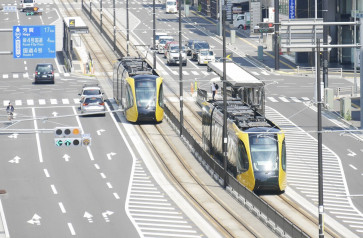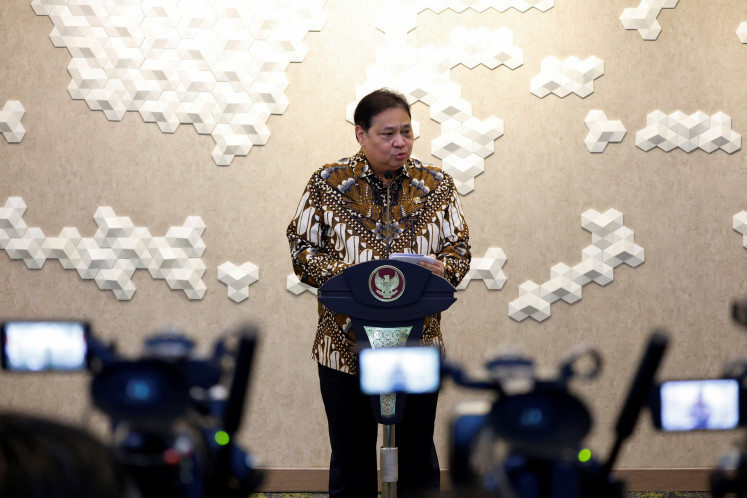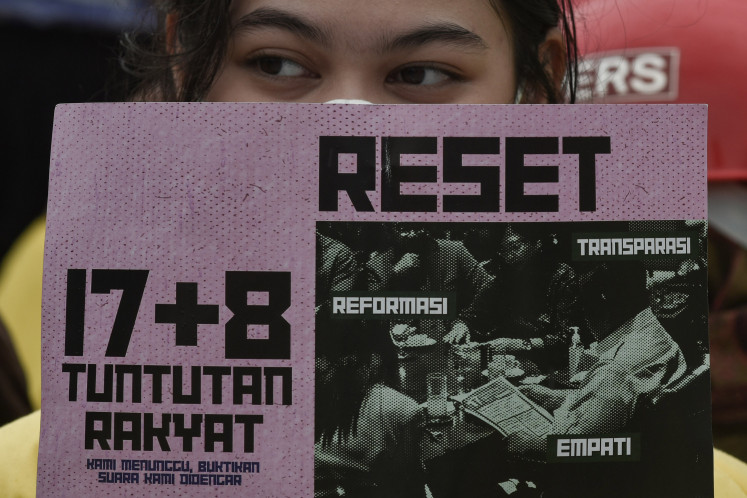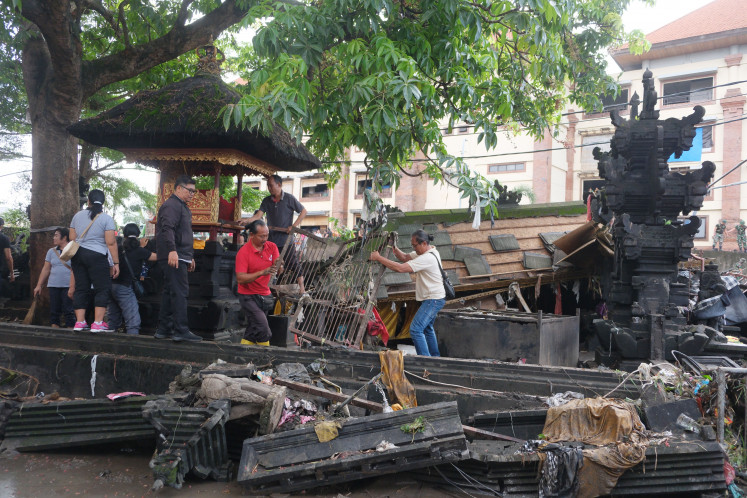Popular Reads
Top Results
Can't find what you're looking for?
View all search resultsPopular Reads
Top Results
Can't find what you're looking for?
View all search resultsLet us make ASEAN matter to our people
Since the Jakarta Summit, there have been plenty of discussions and consultations among ASEAN ministers and officials, and also with our dialogue partners, to prepare for this meeting in Bali
Change text size
Gift Premium Articles
to Anyone
S
ince the Jakarta Summit, there have been plenty of discussions and consultations among ASEAN ministers and officials, and also with our dialogue partners, to prepare for this meeting in Bali. Before that, in the first three months after Indonesia assumed ASEAN chairmanship, ASEAN foreign ministers met four times.
As we all know, the vision of ASEAN Community was endorsed in 2003 here in Bali, and then in Cebu in 2007, ASEAN agreed to reach the goal of ASEAN Community by 2015.
I have high hopes that ASEAN Foreign Ministers Meetings will be able to give shape and add content to the progress that has been achieved at the last Summit for this is going to be a challenging year for ASEAN.
The emerging economies, including in Southeast Asia, continue to grow and drive global economic recovery. But Europe is still grappling with economic disruptions and is likely to be in that situation in the near future. In the US, the budget debate over debt ceiling remains, and, if left unresolved in early August, it can negatively affect the global economy.
The price of oil remains high and volatile – hovering just below US$100 per barrel – while the Arab Spring continues to unsettle the Middle-East. Japan is still struggling with its full recovery, affecting the global supply chain. The six-party talks over the Korean nuclear issue have not been resumed. Meanwhile, the regional architecture in the Asia Pacific continues to evolve.
Against all these backdrops, there is great expectation that ASEAN will be able to consolidate our position and be a driver of peace, development and international cooperation in Southeast Asia and beyond. This is an expectation that I know we are able to meet.
There are several major areas where we hope to see steps forward. To begin with, we must push harder in the promotion of peace, cooperation and stability for our region.
I am delighted that the situation between Cambodia and Thailand has gradually improved. The situation, admittedly, has not been easy. Yet, there is a willingness on both sides to manage the dispute peacefully through dialogue, to prevent it from deteriorating and to explore confidence-building measures.
Our success in resolving internal disputes is critical to our efforts to attain a healthy ASEAN Security Community.
That is why I have high expectations that the series of ASEAN Foreign Ministers Meeting will pave the way to the launching of an ASEAN Institute for Peace and Reconciliation.
We also need to see some progress on the South China Sea.
ASEAN’s first ever Declaration on the South China Sea was issued long ago – in 1992. It took another 10 years before ASEAN and China could agree on the Declaration of Conduct. And yet, nine years later, we still have not finalized the guidelines of the Declaration of the Conduct of the Parties in the South China Sea. Things do not necessarily have to be this slow.
I ask the Foreign Ministers’ Meeting to step up its efforts, to complete that last mile on this important confidence-building document. We need to send a strong signal to the world that the future of the South China Sea is a predictable, manageable and optimistic one. And we need to finalize the long overdue guidelines, because we need to get moving to the next phase, which is identifying elements of the Code of Conduct.
We also should push for greater traction on a nuclear weapons-free Southeast Asia. There is a positive sign that nuclear disarmament is gaining ground. I am pleased to note, thanks to the work of the Southeast Asian Nuclear Weapons Free Zone Commission, there is a fresh momentum to get the nuclear powers – including China, the United States and Russia – to accede to the ASEAN Nuclear Weapons Free Zone of 1995, at the earliest possible time.
It is also important for ASEAN to step up efforts in addressing people smuggling. With the turbulent events in the Middle-East and South Asia, there is possibility that we will see greater traffic of people smugglers into our region. This is going to continue to be a regional problem and we need to ensure active coordinated efforts to address this festering issue.
Another area where we will need steps forward is regional architecture. We look forward to the constructive participation of the US and Russia in the East Asia Summit this year in Bali. ASEAN must ensure its role as the driver for an East Asia-wide regionalism that is conducive for development.
Along with dialogue partners, ASEAN must improve its capacity to rapidly and effectively respond to the immediate aftermath of a natural disaster. Through such cooperation we could increase better coordination among our military personnel in joint activities other than war.
Under the ASEAN Regional Forum framework, we should increase the frequency of disaster relief exercises, such as ARF DiRex. There needs to be similar efforts carried within the framework of the East Asian Summit.
Still within the context of refining the regional architecture, Indonesia hopes the Foreign Ministers Meeting can lend support to Timor Leste’s application to become a member of ASEAN.
I believe one of the greatest tasks of ASEAN lies in people to people. We are all agreed that a 21st century ASEAN, to be dynamic and relevant, must be people-centered and people-driven.
For the first time, and in contrast to just four decades ago, we are facing a reality where the frequency and depth of contacts between our citizens – through cable television, email, Twitter, Facebook – far exceed the formal contacts between government officials.
There is no government in the world that has all the answers to this new trend. ASEAN too must get into the act: we must be creative and open-minded in harnessing the power of technology to promote people-to-people contact. The establishment of an ASEAN blogger community is one innovative idea, and more should follow.
But I do believe that by far the greater demand for diplomatic creativity will lie in the realm of people-to-people contacts.
The question will not only be how do we advance and proliferate and multiple contacts between our citizens, but also how do we manage them in ways that reduce complications and add benefits and opportunities.
We must make ASEAN matter to our people. We must ensure that ASEAN improve the quality of our lives. And equally important, we must strive to include our people in everything that ASEAN stands for and achieve.
We also need to develop an ASEAN Connectivity that is capable of connecting the entire Asia-Pacific region. An ASEAN Connectivity that is locally integrated and globally connected.
The article is an abridged version of President Susilo Bambang Yudhoyono’s opening statement at the 44th ASEAN Foreign Ministers Meeting (AMM) in Bali on July 19, 2011.










